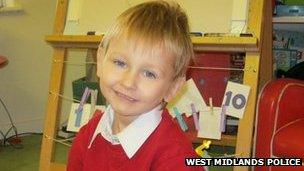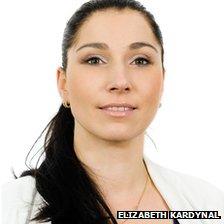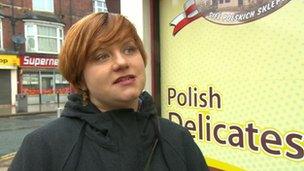Daniel Pelka death exposes Polish integration challenge
- Published

Daniel Pelka's mother and her partner were jailed for 30 years each for the four-year-old's murder
A report into the murder of four-year-old Daniel Pelka from Coventry found he went unnoticed by the professionals he came into contact with.
Last month, his mother Magdelena Luczak and her partner Mariusz Krezolek were jailed for a minimum of 30 years each for what the judge called their "incomprehensible brutality".
Some members of the Polish community in the West Midlands believe that, like Daniel, they too are "invisible" to society and more needs to be done to recognise their needs as a migrant group.
Elizabeth Kardynal, from Walsall, who founded the town's Polish school and European Welfare Association, said there was still "a serious lack of engagement" and Daniel's story was an example of "what will happen if we don't all work together".
"It's not until something really bad happens that people start to react," said Ms Kardynal, who moved to the UK nine years ago.
"We're the second biggest minority group after the Asian community here yet there is no recognition of that or willingness to have a conversation."
'Help them help us'
Ms Kardynal admitted a lack of English could be a barrier but said Polish people also needed more help from the authorities to integrate.
"I've got a list of hundreds of people who need more help than they get with things like access to education, benefits and even legal advice.
"I understand times are tough and there isn't much money around but we are trying to help [councils] help us."
Walsall Council said it worked to offer support to Polish people in the area, including a multi-lingual support service for reporting hate crime.
Councillor Chris Towe said: "It is disappointing to hear that some members of the Polish community do not feel that they are being listened to and supported.

Elizabeth Kardynal set up the European Welfare Association in June
"The council will always do our best to support people of all backgrounds to get the help that they need."
Ms Kardynal said she recently carried out training with West Midlands Police to help raise awareness about the Polish community in the area.
In return, officers trained her 50 volunteers at the Polish school about hate crime.
Supt Chris Johnson from West Midlands Police said hate crime was under-reported across the force area.
"We are training our call handling staff to better identify hate crime and vulnerability so that support can be provided right from the start," he said
Ms Kardynal said she believed better awareness was "vital" after the experience of the Wawrzkiewicz family in West Bromwich.
Monika Wawrzkiewicz said her family's windows were smashed and car tyres slashed, forcing them to move to Wednesbury four months ago.
Her 13-year-old son Damian was also bullied at his former school, Phoenix Collegiate.
"I was pointed at by random people, called names and beaten up so badly that I ended up in hospital," he said.
"I believe it's because I'm Polish, but the school never found out who it was - I reported it several times."
'Different expectations'
Head teacher Gary Hill said he could not comment on individual students but that the school "does not tolerate bullying".
Damian said he was "almost certain" he would end up returning to Poland after gaining a British education.
Alicja Kaczmarek, director of the Polish Expats Association in Birmingham, said isolation was typical of "typical of migrant communities".

Alicja Kaczmarek is director of the Polish Expats Association in Birmingham
"They face lots of barriers, language and cultural (because) people don't often realise how many differences there are."
However she said "overall the Polish community was settling in quite well".
Monika Rozanski, who presented a radio programme for the Polish community on BBC Coventry and Warwickshire, which is no longer on air, said often people found their expectations about moving to the UK let them down.
"For example in Poland you don't go to a doctor to get referred to a specialist whereas here you do and that isn't always explained," she said.
"The Polish community can be quite hard to reach by the police because people are more wary of them in Poland."
West Midlands Police said the force had a number of centres where people can speak in confidence to someone not attached to the force, if they wished.
Ms Rozanski also said language barriers were the risk that Polish people took by moving here.
"It's less of a problem these days but there are still those who move here and have to rely on a relative or friend."
- Published11 September 2013
- Published16 August 2013
- Published3 September 2013
- Published15 August 2013
- Published9 August 2013
- Published2 August 2013
- Published2 August 2013
- Published1 August 2013